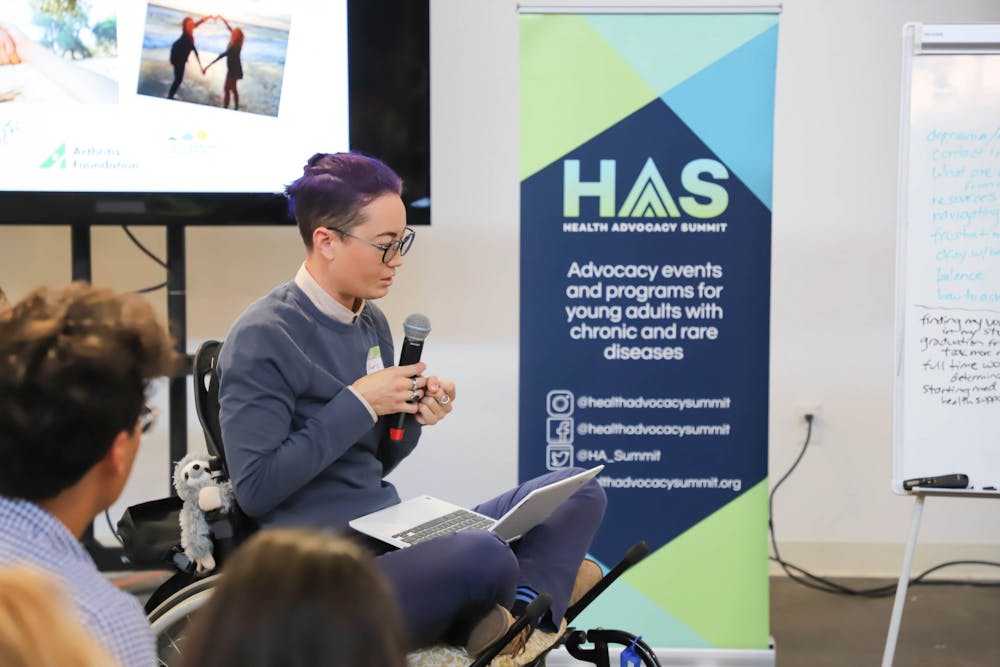When senior Sneha Dave was six years old, she was diagnosed with a chronic illness that led to countless surgeries and hospital stays over the next decade of her life.
The diagnosis: ulcerative colitis, an inflammatory bowel disease that causes chronic ulcers on the large intestine. Dave’s illness made her life difficult and even caused four years of near isolation during middle school and high school, until her final major surgery when her large intestine was removed.
After facing these challenges, Dave created a nonprofit during her freshman year at IU that would soon grow to service seven states, connecting young adults who have had similar experiences with chronic and rare diseases.
The nonprofit, Health Advocacy Summit, offers free day-long events that provide educational sessions for young adults to help them transition from pediatric to adult medical care, an area Dave said is currently lacking in the medical world.
“My original intention was just to do the summits to connect people, but there’s a bigger systematic need in terms of transitional services,” Dave said. “There’s a higher rate of death for certain diseases because patients have medical nonadherence, they have breaks in follow-up visits with their doctors, they have to navigate insurance.”
Dave said the organization has grown rapidly over the past three years, gaining nonprofit status, organizing events in seven different states. They are also piloting a year-long program, the Crohn’s and Colitis Young Adults Network, that connects adolescents who face similar chronic illnesses.
Deanna Hedges, logistic director of the Indiana summit and IU junior, attended the summit as a patient before joining the staff. She said the events provide a sense of community that can be difficult to find among patients with invisible chronic diseases.
“It’s just not a good feeling when other people who don’t know what you’ve gone through are trying to tell you, ‘You haven’t tried this, you need to try this,’” Hedges said. “When it’s other people who are just like you who are experiencing the same thing, who have actually done things that have worked for them, it’s not a bad feeling, it’s an inspiring feeling because you’re working together to try to help each other.”
Katelynn Moore, assistant director of the Indiana summit and senior, said she was unaware that she could have made her own medical journey easier until she attended a summit through this organization.
“I had problems with insurance or medications in the past, and I didn’t really think I had any control over it,” Moore said. “That was really interesting for me to know that there was something I could do.”
Dave said the summits educate attendees about the complexities of healthcare. Sessions cover topics such as navigating school systems or the work place, understanding healthcare topics such as 504 plans, working through mental illness and connecting with peers who have shared experiences of chronic illness.
“Since we deal primarily with invisible illnesses, a lot of our attendees come to us having uncertainty of what it’s going to be like navigating the work place and explaining to their employer when they have episodes of their disease or their condition,” Dave said. “Most, if not all, of adults with chronic diseases have some form of anxiety or depression, so we have a very open discussion about navigating that as well as getting psychosocial support they need.”
Moore said this model helped her feel more knowledgeable about her own treatment.
“It definitely helped me feel like I had more control over things and not just kind of going with whatever everyone was saying,” Moore said.
Dave said when starting the first summits of the organization, she modeled many of the topics after her own experiences with ulcerative colitis.
“I have had this lived experience, so guiding the topics were very personal to me,” Dave said. “I really want my peers to be able to figure out how to navigate these health policy issues that affect them, as well as navigating all of these topics that are really important for adolescents and young adults to start thinking about right now, instead of when are going to be kicked off of their parents’ insurance.”
Dave said because the organization is focused on helping attendees understand topics such as lobbying and medical costs, its funding is independent from pharmaceutical companies.
“We are not interested in working with pharma companies at this point, and other industry members that we feel like will influence not only the content, but the trust of our attendees,” Dave said. “Some of our attendees have trouble getting access to medications.”
Dave and Hedges both said recruiting attendees to come to summits is difficult because it is hard to find people who have chronic illnesses, which are often stigmatized.
“People don’t just tell someone that they have an illness,” Hedges said. “We try to reach out to school nurses, people in disability service, like the dietitian who reached out to me. But I think the most meaningful thing so far to get people to come has just been word of mouth.”
Dave said after graduating next year, she plans to move to Montana to coordinate a summit there, continuing to work on this nonprofit as part of her future career.
“Just being able to share your story publicly is empowering for a lot of the patients that we work with,” Dave said. “I think it’s really great to be educated about what the future is going to be like with a chronic illness and how to prepare for that and use that as a way to kind of continue throughout your career.”




